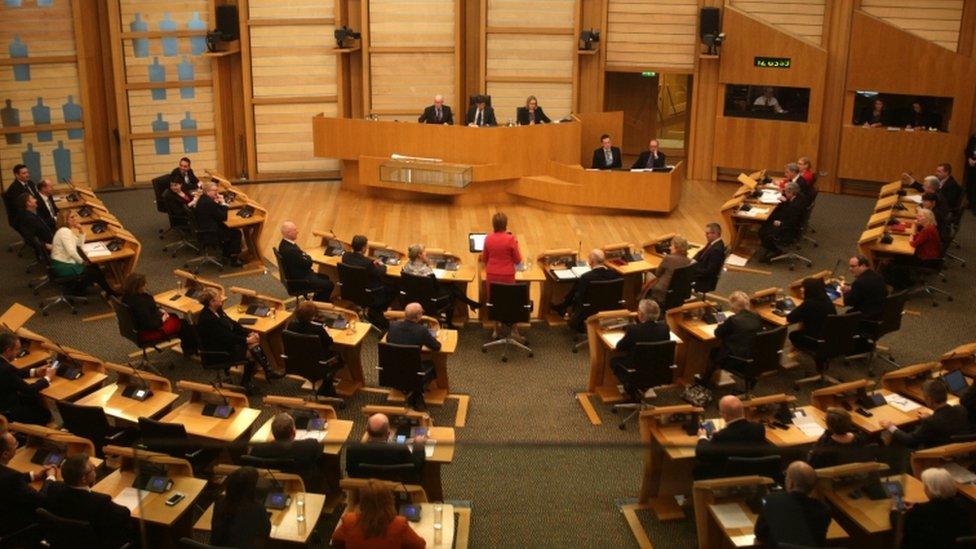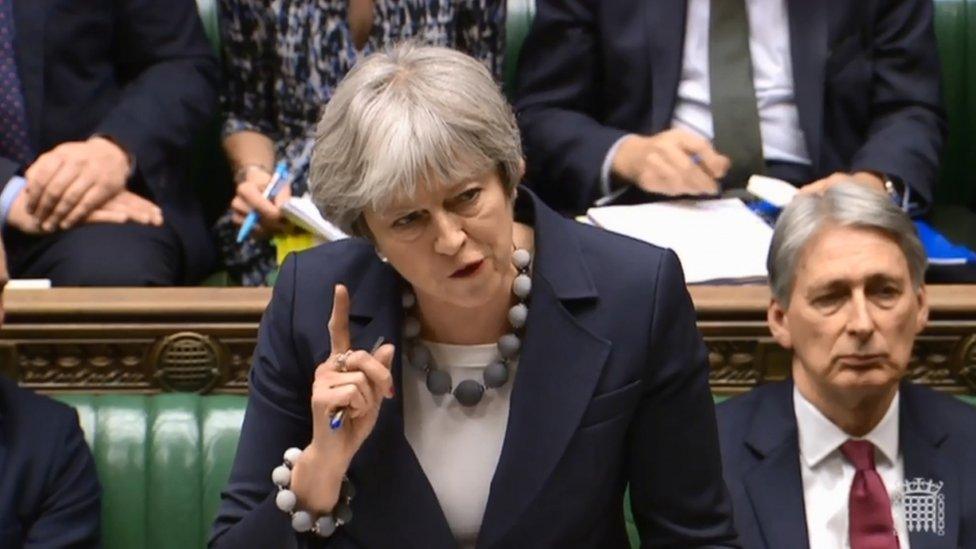Scottish Brexit bill 'likely next month'
- Published

The Scottish government has said an EU Continuity Bill is likely to be introduced at Holyrood next month.
It said the move was needed to prepare Scotland's laws for EU withdrawal if it is not possible to find agreement over the UK government's own Brexit bill.
The Scottish government's view that the Brexit bill is incompatible with devolution was backed on Wednesday by a cross-party Holyrood committee.
Theresa May told MPs on Thursday that the bill would be changed.
But it emerged on Wednesday that the timetable for doing so had slipped, with the UK government now not tabling amendments aimed at resolving its dispute with the devolved administrations until the bill reaches the House of Lords.
Scottish Secretary David Mundell had previously said the changes would be introduced next week, during the report stage in the House of Commons.
Confirmation of the delay was met with anger from the Scottish government, and with frustration and dismay from Scottish Conservative politicians.
In a letter to senior Holyrood officials, Brexit minister Mike Russell and parliamentary business minister Joe Fitzpatrick said their preference was to "work collaboratively with the UK government on the legislative consequences of EU withdrawal".
'Give certainty'
But they added: "Discussions continue on the potential for amendments to be made, but as things stand we need to prepare responsibly for the possibility of consent being withheld.
"To that end, our officials are developing a Continuity Bill for Scotland. This letter is intended to give you and your officials notice of the likely introduction of this bill in February and its submission to you for pre-introduction scrutiny later this month."
They said their intention would be for the bill to be considered and passed by the Scottish Parliament "quickly", in order to "give certainty about the approach in Scotland and to enable enough time for the necessary instruments to be prepared and scrutinised".

Theresa May insists that her Brexit bill will be changed to take account of concerns over its impact on devolution
Mr Russell and Mr Fitzpatrick said the move did not mean that they had definitely resolved to reject the UK government's EU Withdrawal Bill.
But they said: "Unless and until the necessary changes to the bill are made, the Scottish government must provide for an alternative so that on any scenario there is a legislative framework in place for protecting Scotland's system of laws from the disruption of UK withdrawal from the EU."
The Brexit bill has been at the centre of a dispute over what will happen to powers over areas such as fishing and farming once they return from Brussels.
UK ministers want them all returned to Westminster in the first instance, before some are devolved and some woven into UK-wide frameworks - but Scottish and Welsh ministers term this a "power grab".
What does the prime minister say?
Speaking at Prime Minister's Questions, Theresa May defended her government over its attempts to reach an agreement with the devolved administrations.
In response to a question from the SNP's Westminster leader, Ian Blackford, she said: "The SNP say they want to work with us on the future frameworks and we are doing exactly that. They say they want clause 11 amended and we are doing exactly that.
"(Mr Mundell) is intensifying his discussions with the Scottish government, and indeed with the executive in Wales, as part of this.
"We will be bringing forward amendments, but he says that this is a government that never delivers for Scotland. £2bn extra as a result of the Budget, that's delivering for Scotland."
What is the EU Withdrawal Bill?
The bill will repeal the 1972 European Communities Act, which took Britain into the EU and meant that European law took precedence over laws passed in the UK Parliament. It will also end the power of the European Court of Justice in the UK.
All existing EU legislation will be copied across into domestic UK law to ensure a smooth transition on the day after Brexit.
The UK government says it wants to avoid a "black hole in our statute book" and avoid disruption to businesses and individual citizens as the UK leaves the EU.
The UK Parliament can then "amend, repeal and improve" individual laws as necessary.
Ensuring the continuity of EU rules and regulations is also meant to aid trade negotiations with the EU because the UK will already meet all of its product stands.